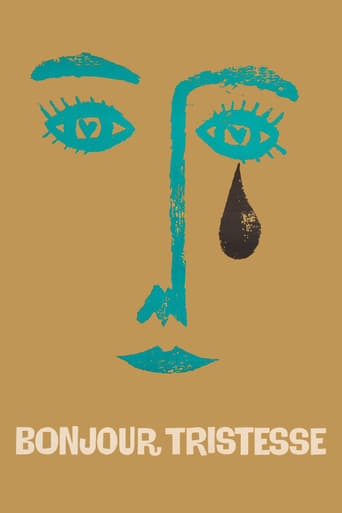JasparLamarCrabb
Otto Preminger directs this light as a feather story. Bohemian Jean Seberg and her equally bohemian widower father David Niven holiday in the South of France with nutty Mylène Demongeot. Things are fine until family friend Deborah Kerr shows up. Nivens, a degenerate womanizer, finds the conquest of Kerr too hard to resist. That's fine with Seberg, as long as Niven loves her and leaves her (as he's done with all the women in his past...including Demongeot). When it appears as though she's becoming second banana in Niven's life, Seberg exact revenge on Kerr. Preminger tells the story in flashbacks from Seberg's perspective and cleverly combines black and white with sunnier color scenes. The cinematography by Georges Périnal is stunning. The film features some of Preminger's least heavy-handed direction, although he rarely allows any close-ups, which makes it difficult to make out what the actors are really feeling. Arthur Laurents wrote the script and it's full of acidic dialog and funny scenes (mostly involving bird-brained Demongeot). Seberg acquits herself fairly well, but Niven is at his least appealing...and he shows no chemistry with either Seberg or Kerr. Preminger really mis-steps with that casting. It's a role that seems tailor made for someone closer to Charles Boyer. With Geoffrey Horne as Seberg's would-be suitor and Martita Hunt as his daffy mother. Juliette Gréco, playing herself, sings the title song in a Paris nightclub. The great titles are by Preminger regular Saul Bass.
bkoganbing
The trio of David Niven, Deborah Kerr, and Jean Seberg star in Otto Preminger's Oedipal drama Bonjour Tristesse. With those Givenchy gowns featured, how did Audrey Hepburn miss this film?Based on the Francoise Sagan novel, this is one strange tale of a playboy father, the daughter who adores him and the woman who threatens to come between them. Niven is the playboy who must have inherited his wealth because he doesn't look like he worked a day in his life. At one time he was married and had Seberg with his late wife. Anyway she travels with him and enjoys life and its vices the same way he does.It's all right when Niven's fooling around with Mylene Demongeot, the latest in a string of flings, but when old flame Deborah Kerr shows up and wants to marry Niven, that puts Seberg off.Truth be told Kerr had no right acting like a stepmother before the wedding. Still it didn't justify what Seberg set in motion that ends in tragedy.The novel is French based of course and I think the French should have filmed it. I think Otto Preminger was just the wrong director for this kind of material. Geoffrey Horne plays Seberg's boyfriend and Martita Hunt is his mother round out a stylish cast. But with only one actual person of French nationality among the main cast. that was a big mistake.
sevisan
As Andrew Sarris said, "Preminger changes trash into art". Yes, and this film is the best proof. From a very dated novella from Francoise Sagan, we get a simple, subtle and elegant film. THE SUNNY PAST: pink, blue and yellow colors (the shirts and bathing costumes, the sea "like velvet" as Cecile says), the umbrella falling and hiding Cecile and her boyfriend, the geometric lines of the house with its wonderful environment, the pine trees (you can almost smell them). Everything as the background of a drama that will soon burst. THE BLEAK PRESENT: Grey Paris, the picture gallery, the "existentialist cave", Concordia Square, Les Halles, the luxurious apartment where is hidden a painful souvenir, and, above all, Cecile makeup in front of the mirror. Juliette Greco sings: "My smile is void of loving/my kiss has no caresses/I'm faithful to my love/my bittersweet tristesse". Very god performances from Jean Seberg and David Niven (she is here much better than in "Lilith"). Cinematography: Georges Perinal, music: Auric (remember the Cocteau films), credits: Saul Bass.
moonspinner55
Wealthy playboy father and his precocious seventeen-year old daughter share a sassy, flirty relationship with one another while teasing and leading-on potential romantic partners for both. But the fun and games are called to a halt once dad is reunited with an old friend of the family, a chic fashion designer who would like to see both father and daughter get serious about their lives. Talented writer Arthur Laurents adapted his screenplay from Françoise Sagan's book, yet even with Otto Preminger directing a classy cast, this soaper set on the Riviera never comes to a boil. Preminger sees the idle rich as spoiled and decadent, dancing away mindlessly into the night, yet the players (David Niven and gamine Jean Seberg as father and daughter, Deborah Kerr as Niven's fiancée) bring a lot more heart and human interest to the piece than was probably intended. As such, the characters are more embraceable than the writing and handling, and portions of the film are puzzling or awkward. Still, film-lovers of this era in cinema will no doubt bask in the lush surroundings, not to mention in the enjoyable performances and beautiful photography (black-and-white for the present day, color for the past). The script might have benefited from more honesty in the finale--the 'irony' in bringing these dead-end lives full circle isn't very cutting--and there are two supporting characters who are given the shaft by Laurents. There are certainly pleasures to be had here, however, most notably in the scenes between Kerr and Seberg. **1/2 from ****




